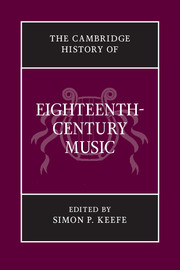Book contents
- Frontmatter
- PRELUDE
- PART I MUSIC FOR THE CHURCH
- INTERLUDE
- PART II MUSIC FOR THE THEATRE
- 8 Italian opera in the eighteenth century
- 9 Opera in Paris from Campra to Rameau
- 10 An instinct for parody and a spirit for revolution: Parisian opera, 1752–1800
- 11 German opera from Reinhard Keiser to Peter Winter
- 12 The lure of aria, procession and spectacle: opera in eighteenth-century London
- 13 Music theatre in Spain
- 14 Opera in Sweden
- INTERLUDE
- PART III MUSIC FOR THE SALON AND CONCERT ROOM
- POSTLUDE
- Appendix I Chronology
- Appendix II Institutions in major European cities
- Appendix III Personalia
- Index
- References
13 - Music theatre in Spain
from PART II - MUSIC FOR THE THEATRE
Published online by Cambridge University Press: 28 March 2011
- Frontmatter
- PRELUDE
- PART I MUSIC FOR THE CHURCH
- INTERLUDE
- PART II MUSIC FOR THE THEATRE
- 8 Italian opera in the eighteenth century
- 9 Opera in Paris from Campra to Rameau
- 10 An instinct for parody and a spirit for revolution: Parisian opera, 1752–1800
- 11 German opera from Reinhard Keiser to Peter Winter
- 12 The lure of aria, procession and spectacle: opera in eighteenth-century London
- 13 Music theatre in Spain
- 14 Opera in Sweden
- INTERLUDE
- PART III MUSIC FOR THE SALON AND CONCERT ROOM
- POSTLUDE
- Appendix I Chronology
- Appendix II Institutions in major European cities
- Appendix III Personalia
- Index
- References
Summary
The establishment of a new dynasty
From the beginning of the eighteenth century Spanish music theatre was distinguished by two features above all: the literary and musical tradition of the previous century, especially the plays (‘comedias’, ‘zarzuelas’ and operas) of Pedro Calderón de la Barca (1600–81); and the dynastic change from the House of Habsburg to the House of Bourbon and the subsequent War of the Spanish Succession (c. 1703–14). For Spain, this was not simply a war between European powers such as France, England and Austria, but rather a civil war, in which parts of the population and nobility favoured the young Bourbon King Philip V, grandson of Louis XIV of France, while others supported the Habsburg pretender Archduke Charles (later Emperor Charles VI). These internal conflicts could not fail to affect the political, social and cultural order of the relatively young Spanish state, which was still moving tentatively towards its own national identity.
Indeed, the War of the Spanish Succession had consequences that affected not only the territorial shape of Spain, but also the state’s very identity. Dynastic succession, for example, had turned out to be a problem solvable not by reason or law but only by force, and affected the legitimacy of the Bourbon King of Spain (who was only accepted by the Viennese court as late as 1748 in the Treaty of Aix-la-Chapelle); similarly affected were claims to the thrones of Naples and Sicily, which were occupied from 1707 (Naples) and 1713 (Sicily) by a Habsburg Viceroy, and from 1734 and 1735 by a Bourbon King, the Spanish infante Charles (later Spanish King Charles III).
- Type
- Chapter
- Information
- The Cambridge History of Eighteenth-Century Music , pp. 402 - 419Publisher: Cambridge University PressPrint publication year: 2009
References
- 1
- Cited by

